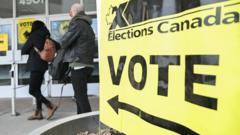Despite potential for reversal, the economic disruptions caused by Trump are likely to have enduring consequences for both America and the world stage.**
The Lasting Impact of Trump's Economic Policies on Global Stability**

The Lasting Impact of Trump's Economic Policies on Global Stability**
An exploration of the long-term effects of Trump's economic decisions and their implications for future administrations.**
In his short tenure, President Trump has ignited significant changes within the global economic framework that are proving difficult to dismantle. His aggressive trade policies, withdrawal from international treaties, and suggestions of shifting America's defense commitments in Europe have started to reshape long-standing geopolitical dynamics.
Over just 100 days, the administration’s actions have disrupted established norms and led to a climate of uncertainty among businesses and governments alike. With potential midterm elections looming in two years, there's speculation about the possible shift in power dynamics within Congress, however, the trajectory laid by Trump could create hurdles for any subsequent administration aiming to revert these changes.
As noted by analysts and historians, the foundation of trust that the U.S. built over decades is faltering, a danger that extends beyond Trump's presidency. Economists warn that the fundamental issues that fueled the “Make America Great Again” agenda — such as escalating inequality and economic insecurity — will remain relevant regardless of who governs. This ongoing climate of fear of reemergence of similar political figures underscores the complexities of reversing Trump’s economic strategies and their impact on both domestic and international relations. As Professor Ian Goldin from the University of Oxford pointed out, the MAGA movement and its supporters, including key Republican figures, will likely stay influential, pushing a narrative that could reemerge with a new face in future elections.
Woven together, these elements suggest that while political winds may shift, the stabilization of global economics could take far longer than expected. The long-term governance challenges presented by Trump’s policies may serve as a stark reminder of the fragility of global trust and the intricate web of international relations shaped by the actions of a singular leadership.
Over just 100 days, the administration’s actions have disrupted established norms and led to a climate of uncertainty among businesses and governments alike. With potential midterm elections looming in two years, there's speculation about the possible shift in power dynamics within Congress, however, the trajectory laid by Trump could create hurdles for any subsequent administration aiming to revert these changes.
As noted by analysts and historians, the foundation of trust that the U.S. built over decades is faltering, a danger that extends beyond Trump's presidency. Economists warn that the fundamental issues that fueled the “Make America Great Again” agenda — such as escalating inequality and economic insecurity — will remain relevant regardless of who governs. This ongoing climate of fear of reemergence of similar political figures underscores the complexities of reversing Trump’s economic strategies and their impact on both domestic and international relations. As Professor Ian Goldin from the University of Oxford pointed out, the MAGA movement and its supporters, including key Republican figures, will likely stay influential, pushing a narrative that could reemerge with a new face in future elections.
Woven together, these elements suggest that while political winds may shift, the stabilization of global economics could take far longer than expected. The long-term governance challenges presented by Trump’s policies may serve as a stark reminder of the fragility of global trust and the intricate web of international relations shaped by the actions of a singular leadership.






















